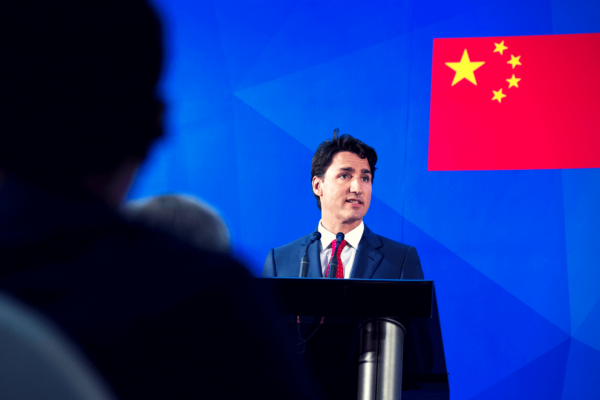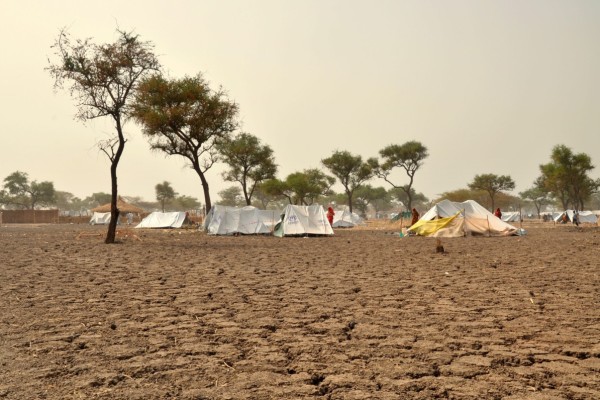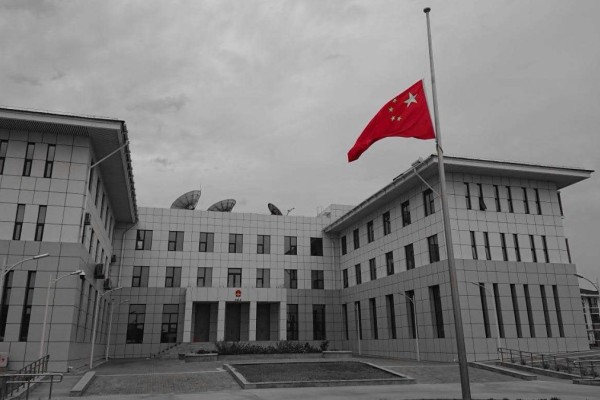Why is Canada still silent on India’s colonization of Kashmir?

A soldier guards the roadside checkpoint outside Srinagar International Airport in Jammu and Kashmir, India, January 2009. Photo from Wikimedia Commons.
Last week, AFP reported on the Indian government’s eviction of hundreds of forest dwellers living in communities in the remote woodlands of Kashmir, the country’s northernmost region.
In Kanidajan village, a small community in Indian-occupied Kashmir (IOK), Biya Bano lives with her husband and eight children. She told AFP that forest guards warned her family that they would be burned alive inside their log home if they did not immediately vacate it.
Government officials had entered the area to cut down 11,000 fruit trees cultivated by dozens of subsistent families.
On August 5, 2019, the Kashmiri people lost their autonomous status, when the president of India arbitrarily revoked Article 370 and 35A of the Indian constitution and suspended the Jammu and Kashmir constitution.
Then, a year ago, on March 31, 2020, India’s Ministry of Home Affairs redefined domicile rules for the region, allowing non-Kashmiris to acquire property and settle in the state.
These changes followed a period of increased repression carried out by the Indian government, which has “clamped down on life in Kashmir” by imposing curfews and limiting communications, including an 18-month-long ban on high-speed mobile internet service.
This has opened the door to widespread demographic changes that threaten job security for local Kashmiris, among other human rights abuses. Now, with the world fixated on the COVID-19 pandemic, settler-colonization has been in hyperdrive, weakening Kashmir’s right to autonomy and self-determination.
Over the last few months, more than 3.3 million domicile certificates have been issued by the occupying power to its own settler population.
As a result, the Indian government has shifted the demographics in IOK to being one-quarter non-Indigenous settlers. To put this in context, a similar shift has happened over a half-century in the occupied West Bank of Palestine with fewer than one million settlers, resulting in numerous United Nations resolutions and heightened international attention.
By comparison, in just a matter of months, India’s colonization of Kashmir has produced dramatic demographic changes, yet this has resulted in relatively little international attention.
The AFP report provides important insights into the ongoing military occupation that is violently forcing people from their homes while Indian soldiers destroy trees, crops, and livestock. There are close to a million Indian troops stationed in occupied Kashmir, making it the world’s largest region occupied by a security force.
Since Kashmir is an internationally disputed territory, the 2020 domicile law—which entails forced transfer of populations and settlement—is in contravention of international law. Such population transfer is prohibited by Article 49 of the Fourth Geneva Convention and is condemned by the United Nations Sub-Commission on the Promotion and Protection of Human Rights.
Under Article 1 of the Fourth Geneva Convention, all high contracting parties, which includes Canada, are required to take action to ensure respect for the convention “in all circumstances.”
Soldiers in Srinagar, the largest city in Jammu and Kashmir, on a patrol through town. Photo from Flickr.
In 2019, Genocide Watch issued a “Genocide Alert” for Kashmir, stating that “genocidal processes are […] far advanced” in the region. The group called upon the UN and its member states to “warn India not to commit genocide in Kashmir.”
As I wrote recently, the mainstream media has been largely silent about India’s aggressive and illegal settler-colonization in IOK (with the exception of some coverage of the restoration of 4G internet and cellphone service, a move mainly put in place to facilitate the settlement underway, and to deflect some attention away from the farmers’ protest exploding across the country).
Last week’s AFP report indicated that in November 2020, authorities began sending out eviction notices after claiming that more than 60,000 people were illegally living in or cultivating land in Kashmir’s forests. A senior Indian official, who asked to remain anonymous, told AFP there was “a lot of pressure from higher authorities to be unsparing” on land matters.
Abdul Ghani, who lives on the edge of the Kanidajan forest, told AFP that his orchard of 300 apple trees was chopped down without warning.
“They came on the sly, otherwise we would have laid down our lives but not let them destroy the trees,” the 70-year-old said.
According to the report, Ghulam Khatana’s family “lived half their lives in a simple log hut in Kashmir’s forests, until 200 men brandishing guns and iron rods chased them out of their home and into the blistering cold.”
Civil society groups have been calling on the Canadian government to condemn India’s new domicile law and its illegal settlement and colonization of IOK, and to insist upon compliance with international legal obligations as part of Canada’s ongoing relationship with India.
In November 2020, the Canadian government responded to three parliamentary petitions directly related to the situation in IOK. One was sponsored by Liberal MP Yasmin Ratansi, another by NDP MP Scott Duvall, and the third by Conservative MP Marilyn Gladu.
These petitions were signed by 3,500 people from across Canada, and they marked the first time that IOK had been mentioned in parliament since the early-2000s.
Nearly two decades ago, NDP MP Svend Robinson asked then Foreign Minister Bill Graham, “Does Canada continue to support the principle of self-determination for the Kashmiri people and will we call on India to finally accept this political solution to avoid a disastrous war with Pakistan?”
So far, the reaction to the petitions has been less than adequate. The Trudeau government stated that Ottawa is monitoring the situation and “looks forward to the restoration of normalcy and resumption of inclusive political dialogue in Jammu and Kashmir.”
This response misses the crucial point about the continued persecution of Kashmiri human rights defenders, civil society activists and journalists. It also overlooks the fact that Amnesty International India was forced to halt its operations after the government froze its bank accounts. This came after the organization was targeted for speaking out on rights abuses by the Indian military in IOK.
The colonization of Kashmir has been unfolding for more than seventy years, marking a direct assault on Kashmiri culture and identity, the rapid expropriation of land, heightened economic marginalization, and the accelerated forces of settler-colonialism.
In 1948, Canada’s UN representative Andrew McNaughton took the lead as president of the Security Council with the passage of Resolution 47, which provided for a plebiscite on self-determination for all Kashmiris.
Reminding new ambassador Bob Rae of this legacy, we must insist that Canada take leadership at the UN and push for the realization of self-determination for the people of Jammu and Kashmir.
Karen Rodman is the director of Just Peace Advocates, an international human rights organization based in Canada, and a retired senior manager with more than 30 years with the Ontario Public Service. To learn more, watch the webinar Canada’s silence on Indian occupied Kashmir.










